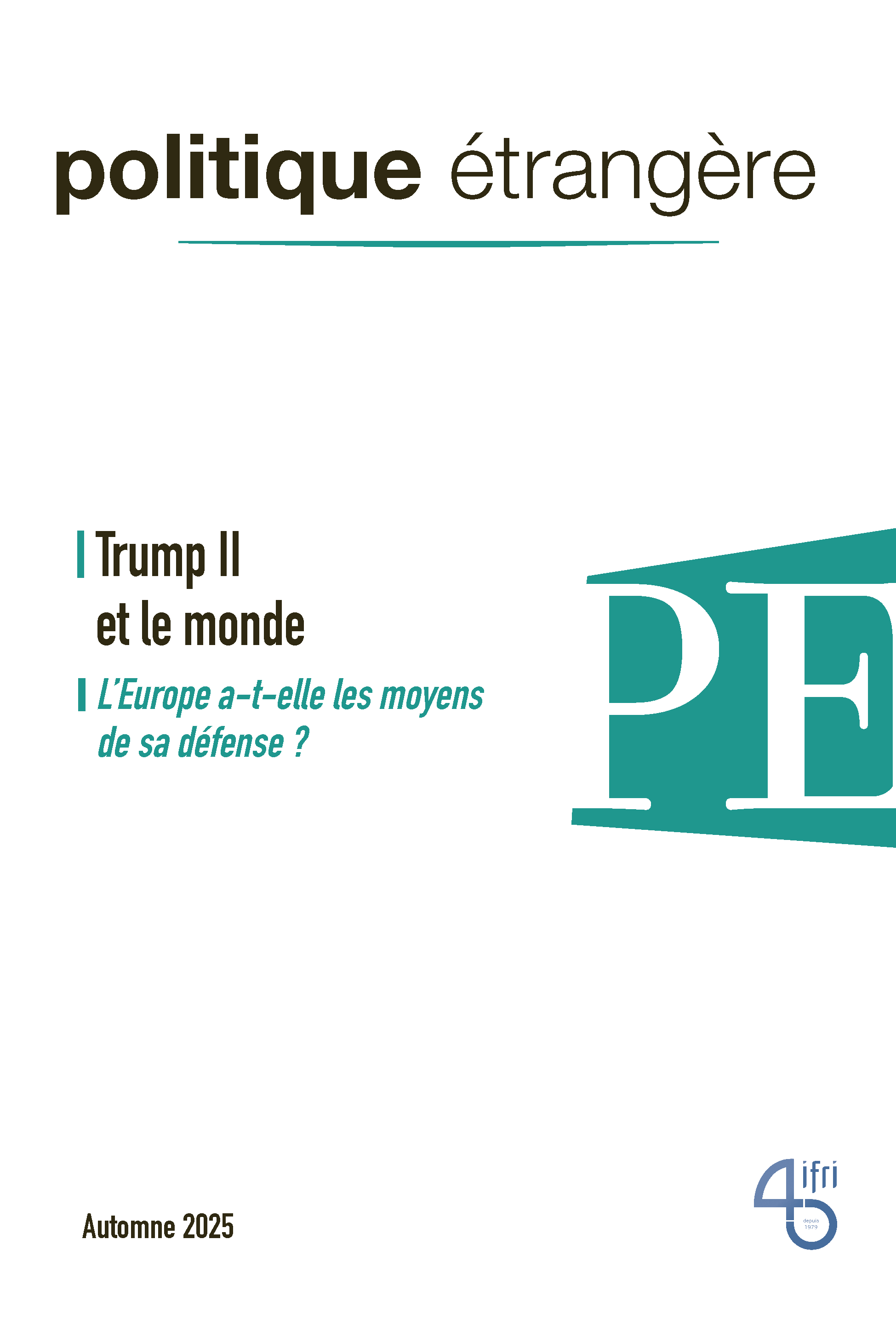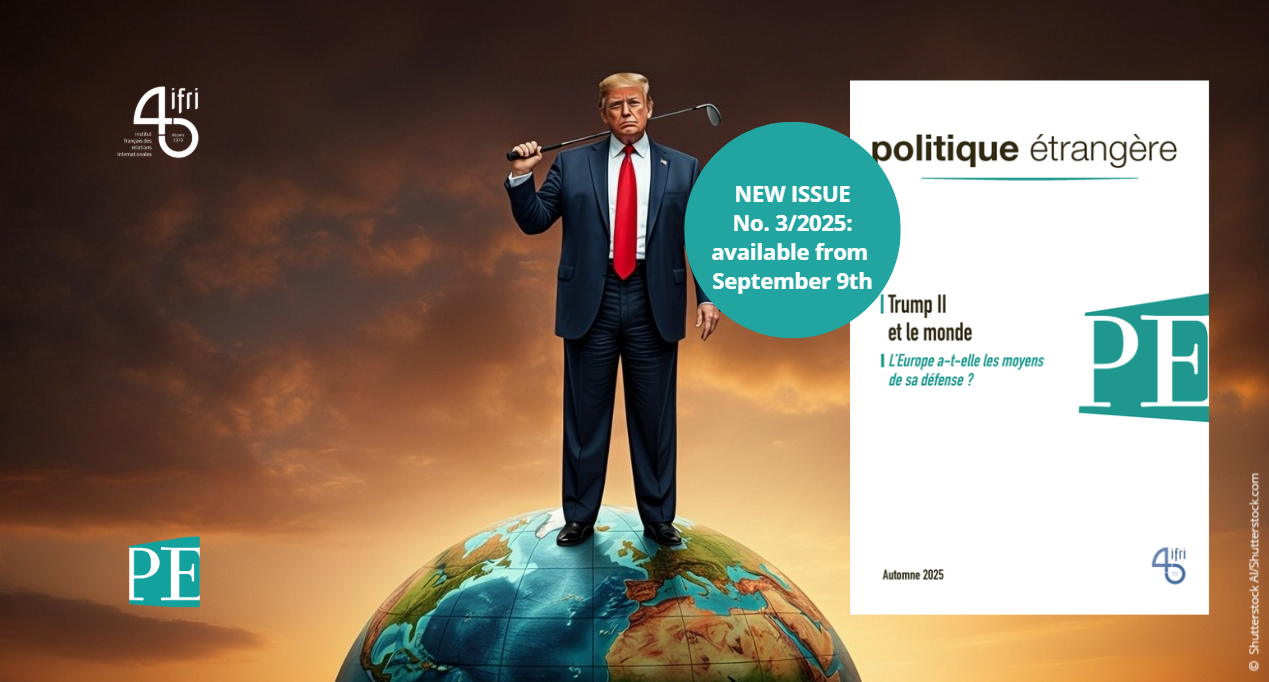Trump II and the World / Politique étrangère, Vol. 90, No. 3, 2025

Does Trumpism exist? And if so, how can its ideology be characterized, given the myriad currents underpinning it—from populism and the Christian Right to paleolibertarianism and technolibertarianism? Does it embody a genuine worldview that informs its diplomatic actions? An obsessive drive to overturn long-standing practices, alliances, and commitments deemed “detrimental” to American interests, coupled with a fixation on transactional, one-off deals, appears to serve as its de facto strategy—hence the widespread weakening of allied ties. Observers are equally at a loss to discern an economic strategy, and above all reluctant to anticipate the possible outcomes of its contradictory maneuvers.

Faced with the Trump tornado and the havoc it is wreaking on the Old Continent, European nations seem hesitant: How will they ensure their security going forward—and against whom, and with what means—if the United States confirms even a partial withdrawal of military support? How should Europeans go about devising a comprehensive security strategy? How can their concrete defense needs be identified? Should Europeans turn a blind eye, resign themselves to the situation, or rally their forces to change it—and at what economic and political cost?
European interests extend beyond the continent itself. For this quarter, Politique étrangère also turns its attention to the Middle East, sub-Saharan Africa, and the Asia-Pacific region, the main stage for the economic tug-of-war between China and the US. It also examines the misfortune that has befallen Haiti—a situation in which France played no small part, yet it remains one of the few countries actively concerned about Haiti’s plight.
This issue is available in French only: Trump II et le monde
TRUMP II AND THE WORLD
Trump II: The Clash of Ideologies, by Laurence Nardon
The Geopolitics of the Second Trump Administration, by Alix Frangeul-Alves and Martin Quencez
Donald Trump’s Economic Nationalism, by Norbert Gaillard
Trump II and Asia: The Wind is Picking Up..., by Marc Julienne
The Second Trump Administration and the Middle East, by Rym Momtaz
DOES EUROPE HAVE THE MEANS TO DEFEND ITSELF?
The Defense of Europe: A New Crisis of Principles, by Olivier Schmitt
Europe Uncovered?, by Élie Tenenbaum and Guillaume Garnier
CURRENT AFFAIRS
Turkey-PKK: Forty Years, All for Nothing?, by Adel Bakawan
Iraqi Shiites: Religious and Strategic Drivers of Iranian Influence, by Alain Monnier
BAROMETERS
Jihadism: North African Combatants in the Syrian-Iraqi Zone, by Djallil Lounnas
The Challenges Facing Nigerian Oil in the Niger Delta, by Marc-Antoine Pérouse de Montclos
Value Chains and Investments in Asia, by Paul Salez
REFLECTIONS
Iran’s Nuclear Program: Evaluation Methods and Difficulties, by Cyril Gelibter
Haiti 1825–2025: The Geopolitics of Debt, by Jean Marie Théodat
BOOK REVIEWS
Editor: Marc Hecker
Multinationales. Une histoire du monde contemporain, by Olivier Petitjean and Ivan du Roy (eds.), by Vincent Vicard
232 pages. 23 euros.
September 9th, 2025.
Diffusion : Pollen/Dif'Pop.
Subscription: Armand Colin.
To buy an issue: leslibraires.fr.
To buy the Epub (in French): Immatériel.fr.
Have a look on Politique étrangère's blog: Politique étrangère.

Available in:
Themes and regions
ISBN / ISSN
Share
Download the full analysis
This page contains only a summary of our work. If you would like to have access to all the information from our research on the subject, you can download the full version in PDF format.
Trump II and the World / Politique étrangère, Vol. 90, No. 3, 2025
Find out more
Discover all our analysesForeword
In this special issue of Foreign Policy devoted to the proceedings of the conference organized by Ifri on April 10, 2019, in the Grand Amphitheater of the Sorbonne, on the occasion of its fortieth anniversary, read the foreword by Thierry de Montbrial, founder and president of Ifri.
Conclusions
In this special issue of Politique étrangère devoted to the proceedings of the conference organized by Ifri on April 10, 2019, at the Grand Amphitheater of the Sorbonne, on the occasion of its 40th anniversary, read the speech by Jean-Yves Le Drian, French Minister of Europe and Foreign Affairs.
New Global Challenges and European Security
In this special issue of Politique étrangère devoted to the proceedings of the conference organized by Ifri on April 10, 2019, in the Grand Amphitheater of the Sorbonne, on the occasion of its fortieth anniversary, discover the debate moderated by Nicole Gnesotto between Julian King, Jean-Marie Guéhenno, Wolfgang Ischinger, Nathalie Tocci, Hubert Védrine.
Industry Response to New Protectionism
In this special issue of Politique étrangère devoted to the proceedings of the conference organized by Ifri on April 10, 2019, in the Grand Amphitheater of the Sorbonne, on the occasion of its fortieth anniversary, discover the debate moderated by Thierry de Montbrial between Jean-Paul Agon and Patrick Pouyané.






